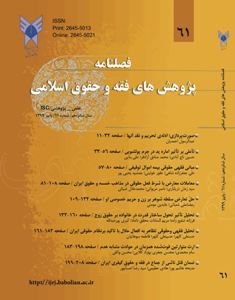تأملی بر تأثیر اماره ید در جرم پولشویی
محورهای موضوعی : حقوق خصوصیحسین تاج آبادی 1 , محمد صادق آزادفر 2 , علی بنایی 3
1 - دانشیار، گروه فقه و مبانی حقوق اسلامی، دانشگاه صنعتی مالک اشتر،تهران، ایران
2 - دانشجوی دکتری،گروه حقوق جزا و جرم شناسی، دانشگاه امام صادق (ع)، تهران، ایران
3 - گروه الهیات، دانشگاه علامه طباطبایی، تهران، ایران
کلید واژه: حکم ثانوی, حکم حکومتی, پولشویی, اماره ید, اخلال در نظام اقتصادی,
چکیده مقاله :
پدیده پولشویی در عصر حاضر به یکی از معضلات اقتصاد جهانی تبدیل شده است. از این رو، کشورها و مجامع بین المللی به طور جدی قصد دارند با این پدیده و آثار و تبعات مخرب آن مقابله نمایند. جمهوری اسلامی ایران هماندد سایر کشورها برای مقابله با جرم پولشویی در سال 1386 به تصویب قانون مبارزه با پولشویی در دوازده ماده مبادرت ورزید. علاوه بر معضلات و آثار مخربی که این پدیده بر اقتصاد کشورها از جمله جمهوری اسلامی ایران دارد، وجود ماده ی 1 قانون مبارزه با پولشویی (اماره ید) سبب بروز مشکلات عدیده ای شده است که از جمله آنها به فرجام نرسیدن پروندههای مفتوحه و صدور رأی برائت می باشد. بر همین مبنا پژوهش حاضر با تمسک به ادلهسنتی قاعده ید و نیز فقه حکومتی؛ موضوع تأثیر اماره ید در جرم پولشویی و درستی یا نادرستی حذف آن را از قانون مزبور مورد مداقه قرار میدهد و سپس اشعار میدارد که حذف اماره ید در جرم پولشویی خلاف موازین و مقررات شرعی و قانونی میباشد
The phenomenon of money laundering has become one of the problems of the global economy in the present age. Therefore, countries and international forums seriously intend to deal with this phenomenon and its destructive effects and consequences. The Islamic Republic of Iran, like other countries, passed the Anti-Money Laundering Law in twelve articles to combat money laundering. In addition to the problems and destructive effects that this phenomenon has on the economies of countries, including the Islamic Republic of Iran, the existence of Article 1 of the Anti-Money Laundering Law has caused many problems, including the failure to open cases and vote. Accordingly, the present study, relying on traditional arguments of the rule of Amare Yad and government jurisprudence, examines its effect on the crime of money laundering and the rightness or wrongness of removing it from the law, and then concludes that the removal of Amare Yad on the crime of money laundering is against the rules and regulations of Sharia and law.
منابع به زبان لاتین:
48. David Romer,(2011), Social infrastructure, McGraw-Hill publisher.
49.Keh, D.I. (1966). ‘Economic Reform and Criminal Finance’. Transnational Organized Crime, V 2, No 1.
50.Morais, H.V. (2002). ‘The War Against Money Laundering, Terrorism, and the Financing of Terrorism’. Lawasia Journal .
51.Smith.W, (2011), Economic Democracy, the political Struggle of the twenty, Insitute for Economic Democracy press.
_||_Alidoost, A. (2014). Jurisprudence and expediency. Tehran: Institute of Islamic Culture and Thought.
Ameli, M. (198). Shiite means. Qom: Al-Bayt Institute.
Ameli, M. (2012). Wasa'il al-Shi'ah. Beirut: Dar al-Ahya al-Tarath al-Arabi.
Bahr al-Uloom, M. (1983). Journal of jurisprudence: Tehran: Maktab al-Sadiq,
Bahramzadeh, H. A. & Shariati, H. (2004).Anti-money laundering methods, Tadbir Magazine, 149, 22-30.
Farahidi, Kh. (1980). Kitab al-Ain. Qom: Hijrat Publication.
Heidari A. M. (2003). Money laundering in international documents and criminal law of Iran. Qom: Education Complex.
Hosseini, M. (1992). Muntaqi al-Osul. Qom: Amir.
Hosseini, A. (1997). Titles of principles and laws of chapters. Qom: Islamic Books House.
Ibn Manzoor J. (1993). Language of the Arabic. Beirut: Dar Al-Fikr Publication.
Imam Khomeini, R. (1983). Tahrir A l-Wasila. Tehran: Etemad Publishing.
Imam Khomeini, R. (1994). Al-Bay. Tehran: Institute for Organizing and Publishing the Works of Imam Khomeini.
Ismail, I. (1993).The environment in language. Beirut: World of Books.
Johari, I. (1989). Al-Sahah - the crown of the language and the Arabic language. Beirut – Lebanon: Dar Al-Alam for the Muslims.
Kashif al, G. (2001). Kashif al-Ghatta' on the ambiguities of Sharia al-Ghara. Qom: Islamic Propaganda Office Publication.
Katozian Nasser. (2009). Civil law in the current legal order. Tehran: Mizan Publication.
Khosravi, A. (2013). Money laundering and strategies: Collection of articles on crimes against security. Tehran: Institute of Islamic Culture and Thought.
Makarem Shirazi, N. (2001). Research in Hama jurisprudence. Qom: Imam Ali Ibn Abi Talib School Publication.
Makarem Shirazi, N. (2004). Ta'zir and its scope. Qom: Publication of Imam Ali Ibn Abi Talib School.
Makarem Shirazi, N. (2006). Encyclopedia of contemporary jurisprudence. Qom: Imam Ali Ibn Abi Talib School Publication.
Makarem Shirazi, N. (2007). Anwar al-Osul. Qom: Imam Ali Ibn Abi Talib School.
Malek Afzali, M. (2010). The effects of the rule of maintaining order. Tehran: Islamic Government.
Meshkini, A. (1995). Terms of principles and the greatest research. Qom: Nashr al-Hadi.
Montazeri, H. A. (1990). The jurisprudential foundations of the Islamic government. Qom: Tafkar Publication.
Montazeri, H. A. (2007). Religious government and human rights. Qom: Ayatollah Montazeri Office Publication.
Morais, H.V. (2002). The war against money laundering, terrorism, and the financing of terrorism. London: Lawasia.
Najafi, M. A. (1981). Letter in the provinces. Qom: Society of Teachers.
Najafi, M. H. (1984). Jawahar al-Kalam. Beirut: Dar Al-Ahya Al-Tarath Al-Arabi.
Naraqi, M. A. (2001). Mashreq al-Ahkam. Qom: Congress of Naraqi Mullah Mahdi and Mullah Ahmad.
Naraqi, A. (1996). Awaid al-Ayam fi Bayan Qawa'd al-Ahkam. Qom: Publications of the Office of Islamic Propaganda.
Nouri, M. H. (19878). Mustadrak al-Wasa'il wa Mustanbat al-Masa'il. Beirut:Al-Bayt Institute.
Romer, D. (2011). Social infrastructure. London: McGraw-Hill.
Sadr, M. B. (2008). Islam contract. Qom: Encyclopedia of Martyr Sadr.
Sadr, M. B. (1983). Fatwa. Beirut: Press House.
Shams al-Din, M. (1991). The system of rule and administration in Islam. Qom: Dar al-Thaqafah.
Smith.W. (2011). Economic democracy: the political struggle of the twenty. London: Institute for Economic Democracy Press.
Tabatabai, M. H. (1995). Al-Mizan Fi Tafsir Al-Quran. Qom: Islamic Publications Office.
Tabatabai, M. K. (1996). Al-Urwa Al-Wathqi. Beirut: Scientific Institute.
Tusi, A. (1986). Al-Khalaf. Qom: Publications of the Society of Teachers.


